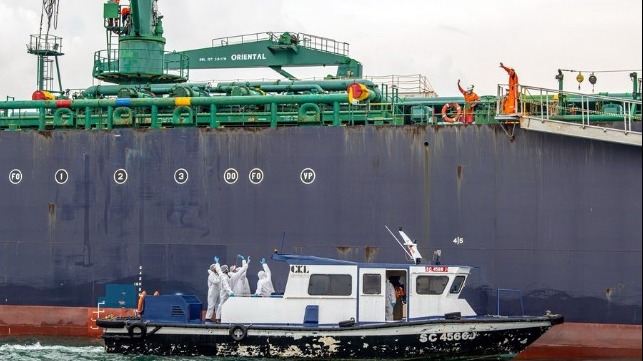INTERCARGO Calls for All Charterers to Allow Crew Changes

Charterers in some instances have been preventing crew changes from occurring, according to INTERCARGO. The trade organization representing the dry bulk sector is seeking to highlight the practice as a means of bringing it to an end. INTERCARGO has also been an outspoken voice in recent months in calling for governments and organizations to make accommodations to facilitate crew changes during the pandemic.
“INTERCARGO strongly condemns the non-compassionate practices of some charterers of dry bulk carriers, in their rejection of crew change outright during the charter period,” the organization said in its statement. “This flies in the face of industry-wide efforts to offer seafarers the essential rest that they have been so long without during the COVID-19 pandemic, and which is essential to the safe operation of the shipping sector.”
INTERCARGO says that it has learned that in a number of instances, charterers in the dry bulk sector have been preventing crew changes from taking place during the period of the charter. They note this is despite the ship owner agreeing to accept the associated costs. In these instances, they say that charterers have been overlooking relevant provisions and charter party clauses that could be employed.
“Ironically, this appalling practice has been reported primarily in the dry bulk sector, where the prevention of seafarer fatigue is of special concern. Bulk carriers on tramp trading routes call at many more ports than other shipping sectors, piling added strain on an already fatigued workforce with no hope of crew change. A crew must be well rested to operate a ship in compliance with the voyage instructions from the charterers: to load and discharge the cargo, ballast, and de-ballast, wash, dry and present cargo holds, open/close hatch covers, and carry out the multitude of associated tasks to ensure safe operation of the vessel,” says INTERCARGO.
They are also highlighting some of the prohibitions enforced against crew changes. For example, they said that in some countries in Southeast Asia that bulk carriers changing crew are being treated as “toxic” by charters for 14 days following the crew changes.

that matters most
Get the latest maritime news delivered to your inbox daily.
Crew changes, however, became a central issue during recent incidents of the coronavirus aboard ships, especially in Western Australia. At the end of September, 80 percent of the crew aboard the bulk carrier Patricia Oldendorff tested positive for COVID-19 and officials later determined that 20 of the 21 crew members had recently completed a crew change in the Philippines. Days later, crew aboard the ore carrier Vega Dream also tested positive for the virus, while in October, New Zealand traced a case of the virus to the container ship the Sofrana Surville that carried out a crew change with seafarers from the Philippines while docked in Auckland.
Last week, the International Maritime Employer’s Council and the International Transport Worker’s Federation working in cooperation set up a new facility for seafarers in Manila. To address concerns raised around the crew changes, the facility will provide a location for testing and quarantine of crew to raise confidence that health and safety protocols are being adhered to for crew changes in the Philippines. The two organizations said they were also exploring establishing similar quarantine facilities in India and the Ukraine for seafarers.
